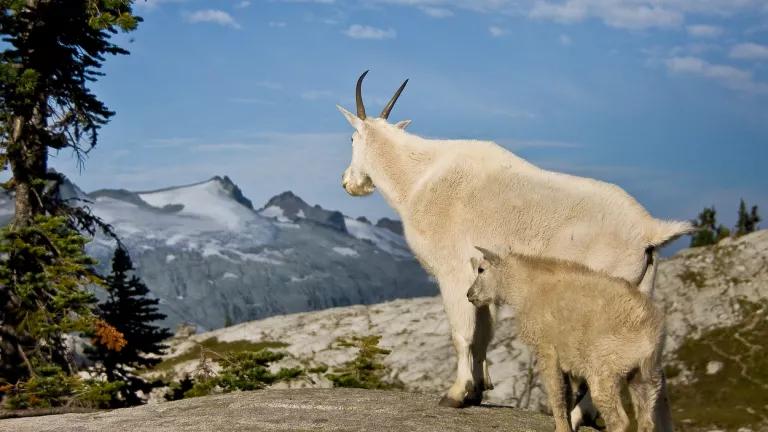Hey GOP, Let’s Get Wild
Despite the Republican swing, the next Congress might actually protect some wilderness. ’Bout time.

Before Congress passed a bill to create Michigan’s Sleeping Bear Dunes Wilderness last March, the last time it had safeguarded a singe acre of public land was in 2009—so long ago that nobody had even heard of Justin Bieber yet. (Good times.)
It’s not that lands bills haven’t been introduced; it’s that the Republican-led House has been on a no-new-protected-areas rampage. “Parks, wilderness, refuges, monuments, nothing. Even the most modest means of land conservation” can’t make it through this Congress, says Bobby McEnaney, senior lands analyst for NRDC (which publishes Earthwire)—which is why President Obama has become such a fan of the Antiquities Act, which allows him to establish national monuments on his own.
That anitpathy could fade in 2015, even with Republicans in control of both houses of Congress for the first time during the Obama presidency. That’s because Representative Bob Bishop of Utah is expected to take the helm of the House Committee on Natural Resources. He’d replace Washington Representative Doc Hastings, who, during his tenure, prioritized mining, logging, and developing oil and gas. (Hastings is retiring at the end of the year.)
Bishop is also pro-oil, but despite that, he’s expected to focus heavily on local lands bills. He has pushed through wilderness legislation in the past and is currently working with Utah stakeholders—including NRDC and other environmental groups, as well as oil and gas officials and county commissioners—to create the Public Lands Initiative. The bill would designate 82,408 acres as wilderness in Utah's northeastern region, the mountainous home to many lynxes and black bears.
“At first glance, Bishop doesn’t seem like someone we could work with,” says Athan Manuel, director of lands protection for the Sierra Club, one of the environmental organizations pushing for the initiative. “But he’s willing to work to find a middle ground. It’ll be interesting to see what happens at the beginning of 2015.”
Bishop’s proposal will have plenty of company, including several bills that have languished so far amid the congressional gridlock. In early November, Democratic Senator Dianne Feinstein, for example, announced a revised bill that would create two national monuments on more than one million acres in the California desert. There’s also the proposed expansion of Washington’s Alpine Lakes Wilderness. And Republican Representative Mike Simpson is going to give his pet project, Idaho’s Boulder-White Clouds Wilderness, another shot.
Getting these passed, however, will still be an uphill battle. “We have a Congress more polarized now than in 100 years, which has obvious implications for public lands, wilderness, and environmental policy more generally,” says Martin Nie, a natural resources policy expert at the University of Montana. “If things were to move forward, I think you’re going to have Republicans ask for greater concessions”—such as allowing logging or energy or mining development on public lands—“that will pose greater threats to the wilderness system.”
The outlook on the Senate side is even less promising. Alaska’s Lisa Murkowski, a huge proponent of fast-tracking “drill, baby, drill” projects, is expected to become chair of the Energy and Natural Resources Committee. She’ll forge ahead with efforts to expedite fossil fuel development, lift the oil and gas export ban, and increase timber cuts on national forests. As for new wilderness designations, the Senate will be under the gun to follow the House’s lead, says Manuel, but there’s no predicting whether the GOP leadership will cave to the pressure.
Which might mean President Obama continues to rely on the Antiquities Act to get things done. He has designated 13 monuments so far, including 9 in his second term. The most recent was 350,000 acres of California’s San Gabriel Mountains, which he announced last month. All told, he has protected more than a million acres of public land.
Presidents of both parties have used the Antiquities Act, but Congress generally doesn’t like the idea. Representative Bishop even wants to amend the act so the president can designate only a single monument each term. It’s likely his concern over Obama acting alone in his home state is what’s kept Bishop at the table, hashing out the Utah wilderness bill with his antagonists, says Nie.
“From my standpoint, the possibility of designating a national monument changes political dynamics,” he says. “It provides important leverage and opens doors for other kinds of protections.” In other words, the Antiquities Act threat could spur lawmakers to finally get off their duffs.
This article was originally published on onEarth, which is no longer in publication. onEarth was founded in 1979 as the Amicus Journal, an independent magazine of thought and opinion on the environment. All opinions expressed are those of the authors and do not necessarily reflect the policies or positions of NRDC. This article is available for online republication by news media outlets or nonprofits under these conditions: The writer(s) must be credited with a byline; you must note prominently that the article was originally published by NRDC.org and link to the original; the article cannot be edited (beyond simple things such grammar); you can’t resell the article in any form or grant republishing rights to other outlets; you can’t republish our material wholesale or automatically—you need to select articles individually; you can’t republish the photos or graphics on our site without specific permission; you should drop us a note to let us know when you’ve used one of our articles.

A Trailblazer for Tribal Sovereignty
Biodiversity 101
Five Indigenous Poets Explore Loss and Love of their Native Lands